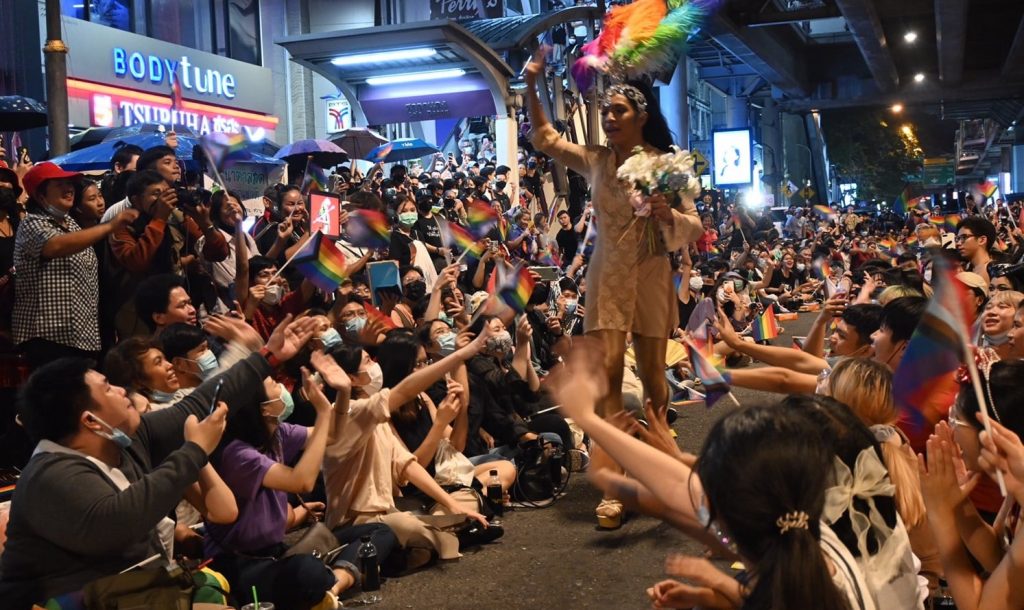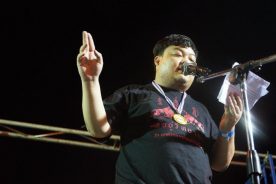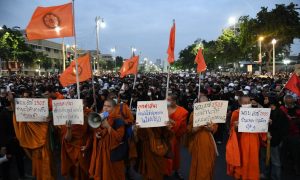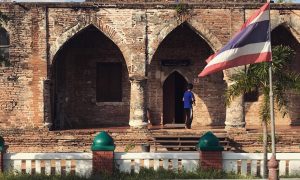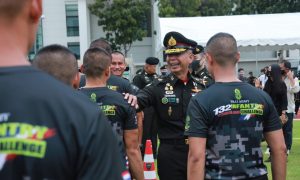‘Are you Thai?’
‘Are you still human?’
These questions capture the core identities of distinct protest movements from different points in Thai political history. The first question—’Are you Thai?’—has been common among right-wing protestors such as the Yellow Shirts, active between 2005 and 2006, as well as the People’s Democratic Reform Committee (PDRC) which played an important role in Thai politics from 2013 to 2014. For almost two decades, right-wing protesters have repeatedly levelled this question at their political opponents.
The second question—’Are you still human?’—has been raised only recently by the People’s Party 2020 (Khana Ratsadon 2563 or คณะราษฎร 2563), the progressive demonstrators currently on the streets calling for political reform and the end of the Prayuth Chan-o-cha administration.
The People’s Party 2020 could be the first nation-wide political movement to incorporate ‘humanness’ into its core discourse. This is quite a phenomenal development for Thai politics and represents nothing less than a challenge to the conditions for membership in the nation.
The ideology of the People’s Party 2020 movement is not only far more inclusive than the condition of ‘being Thai’, it is perhaps more inclusive than discourses of the ‘proletariat’, ‘poor’ and ‘subjects’ employed by previous movements such as the Red Shirts. As a result, the People’s Party 2020 has the potential to mobilise the widest ranging political support in Thai history. By reimagining and expanding the boundaries of who is member to the nation and who is allowed to participate in politics, the People’s Party 2020 movement may be the first step towards more inclusive and deliberative politics in Thailand.
Being ‘Thai’
Saichol Sattayanurak, a leading Thai scholar, argues that the concept of ‘Thainess’ has been constructed by the Thai state and right-wing intellectuals to promote a hierarchical social and political order. The discourse of ‘Thainess’ insists that Thai people are naturally unequal and that everybody should ‘know their place’ and behave accordingly. The practice of ‘knowing one’s place’ starts from micro political institutions such as the family, but successively reenforces the most influential institution of the nation—the monarchy. The father is the head of the family, civilians must not question authority, and subjects must obey the rulers.
The discourse of Thainess establishes membership in the nation as highly conditional: to be a part of this nation and granted political space, you must meet the criteria of Thainess. For conservatives, “being Thai” centres around loyalty to the nation, religion and king. The question “Are you Thai?” was widely invoked by the Yellow Shirts in 2005, but its connotations have intensified overtime with the effect of excluding numerous groups from politics. Being asked this question is an accusation of a lack of patriotism, with the premise that criticising the state, monarchy or broader hierarchical sociopolitical order is a threat to the nation which warrants punishment. As such, ‘Thainess’ has marginalised a variety of groups from rebellious youths, feminists, LGBTQ people and republicans.
Such groups have not only been deprived political space, they have also been a target of persecution. Those charged with lese-majeste or incitement are often previously and simultaneously branded ‘non-Thai’ or ‘nation haters.’ In other cases, people who refuse to show respect to the monarchy have been physically attacked by conservatives.
Redefining the nation
Faced with draconian laws, political violence and exclusion, progressives have fought back with a new discourse of ‘humanness.’ The People’s Party 2020 supporters have started to utter the question ‘Are you still human?’, urging those who vilify pro-democracy groups to reconsider if protecting ‘Thainess’ can justify the sacrifice of basic human rights. A popular hashtag among supporters, ‘Decrease Thainess, Increase Humanness’ (ลดความเป็นไทยให้น้อยลง เพิ่มความเป็นคนให้มากขึ้น) summarises their argument well.
The People’s Party 2020 is redefining the nation by withdrawing the condition of Thainess, imagining a more inclusive and tolerant political body. One of the most common catchphrases of the movement is ‘The nation is the people’ (ชาติคือประชาชน). Here, the word ‘people’ does not mean Thais. Rather, it means ‘citizens’ or ‘humans’ and is culturally and ethnically neutral. This newly-defined nation does not include only ‘Thais’ and discriminates by neither political ideology, cultural or ethnic differences. Protestors also show respect to their new version of the nation, and tacitly insist they are not “nation haters”, by standing for the national anthem at the end of their demonstrations.
It should be noted that a redefinition of the nation is not the same thing as a redefinition of ‘Thainess’. While attempting to redefine the nation, it is unclear whether the progressive protestors are also redefining ‘Thainess’. Unlike the words ‘human’ and ‘nation’, which are seen commonly during demonstrations or in online discussion, the word ‘Thai’ rarely appears. If it does, it is criticised but not necessarily redefined.
After years of ideological work by conservatives, ‘Thainess’ has been deeply ingrained in public discourse in opposition to democracy. ‘Thainess’ is a value that occupies such hegemonic status that redefining it is not a simple task. That is perhaps why the protestors have chosen to redefine the conditions for membership to the nation by replacing Thainess with humanness, but stop short of challenging the meaning of Thainess itself.
The power of ‘humans’
One function of employing the discourse of ‘humanness’ is to prevent political violence, by laying bare the ridiculousness of efforts by conservatives to demonise protesters. The appeal of the People’s Party 2020 to humanness also urges security forces and right-wing mobs to respect their basic human rights, perhaps in the knowledge that crackdowns against past movements such as the Red Shirts have been justified by conservatives on the basis of neutralising ‘threats to the nation.’
However, the discourse of humanness may have meaningful effects on Thai politics beyond the immediate imperative of preventing violence. The People’s Party 2020 has the potential to gain the greatest and most diverse mass support in Thai history. This is in part because no movement in the past employed a discourse of humanness to this extent. The 14 October and the May 1992 movements were fundamentally nationalist and embraced ‘Thainess’ as a core value. The 6 October protesters, the Assembly of the Poor and the Red Shirts defined themselves variously as ‘proletariats’, ‘the poor’ and ‘subjects.’ Such identities primarily focussed on economic inequality, and were probably not relatable to people marginalised in other aspects, such as age, gender or locality.
The People’s Party 2020 embraces marginalised groups deemed ‘less-Thai’ or ‘non-Thai’, offering a stage for diverse and heterogenous groups to bring sensitive issues to the public’s attention. One example is the participation of Malay Muslims from southern provinces, whose expression of grievances towards the Thai state’s violence are regularly branded as sympathetic to terrorism. However, after the rise of the People’s Party 2020, protesters have given speeches condemning atrocities such as the Tak Bai incident and regular forced disappearance cases in the south. It is remarkable that these speeches are being delivered in the middle of Bangkok and other provinces outside the deep south.
The ten demands that shook Thailand
Behind the student protests for reforms to the monarchy that are shaking the century-old foundations of Thailand's political system.
Other marginalised groups have found a space in the People’s Party 2020 movement as well: secondary school students who want to eradicate authoritarianism in education, former red shirts fed up with economic inequality, feminists, sex workers who want to legalise their jobs, LGBTQ people demanding same-sex marriage, and people from the provinces asking for greater decentralisation. All share a similar hope that their problems can be better solved through democratisation, as the popular hashtag ‘if politics is good’ (ถ้าการเมืองดี) suggests.
In the longer term, the political spaces created by the People’s Party 2020 might be the foundation for more participatory, deliberative and inclusive democracy. The public dialogue that the movement has ignited may one day weaken the hierarchy of exclusion, allowing those who have never been heard to be heard.
But though the People’s Party 2020 has gained enormous support, even humanness has its boundaries. So long as Thainess remains hegemonic and is not deconstructed, ‘humanness’ and ‘Thainess’ remain to a significant extent conflicting. It remains to be seen whether and how the movement can engage in dialogue with those who support some degree of political reform but also hold onto traditional notions of Thainess. Perhaps over time, given the generally progressive views held by younger Thais, the discourse of ‘Thainess’ will wither away.
Alternatively, ‘Thainess’ will be slowly redefined into a more inclusive and democratic conception. This scenario is challenging because the discourse of ‘Thainess’ has long been deep-rooted in Thai society. Yet attempting to reconstruct it, just as the People’s Party 2020 is presently reimagining the nation, might be worth the effort. Only when the conflict between ‘Thainess’ and a belief in democracy and fundamental rights to political participation is reconciled will people no longer have to choose between ‘being Thai’ and ‘being human’.
‘คนไทยรึเปล่าเนี่ย?’
‘คุณยังเป็นมนุษย์อยู่มั้ย?’
สองคำถามด้านบนสรุปอัตลักษณ์หลักของขบวนการเคลื่อนไหวต่างๆในช่วงเวลาที่แตกต่างกันของประวัติศาสตร์การเมืองไทยได้เป็นอย่างดี คำถามแรกที่ว่า ‘คนไทยรึเปล่าเนี่ย?’ เป็นคำถามที่พบได้ทั่วไปในหมู่ผู้ประท้วงฝ่ายขวา เช่น คนเสื้อเหลือง ซึ่งมีความเคลื่อนไหวสูงระหว่างปี 2548 ถึงปี 2549 เช่นเดียวกับคณะกรรมการประชาชนเพื่อเปลี่ยนแปลงประเทศไทยให้เป็นประชาธิปไตยที่สมบูรณ์อันมีพระมหากษัตริย์เป็นประมุข (กปปส.) ซึ่งมีบทบาทอันสำคัญต่อการเมืองไทยจากปี 2556 ถึงปี 2557 ในช่วงระยะเวลาเกือบ 2 ทศวรรษนี้ผู้ชุมนุมฝ่ายขวาได้ถามคำถามนี้ต่อฝ่ายตรงข้ามหลายต่อหลายครั้ง
คำถามที่สองที่ว่า ‘คุณยังเป็นมนุษย์อยู่มั้ย?’ ถูกหยิบมาใช้ไม่นานมานี้โดยคณะราษฎร 2563 ซึ่งเป็นผู้ประท้วงหัวก้าวหน้า ที่ปัจจุบันยังคงเคลื่อนไหวอยู่บนท้องถนนเพื่อเรียกร้องการปฏิรูปการเมืองและการยุติบทบาทของรัฐบาลประยุทธ์ จันทร์โอชา
คณะราษฎร 2563 อาจเป็นขบวนการเคลื่อนไหวทางการเมืองระดับชาติกลุ่มแรกที่รวมเอา ‘ความเป็นมนุษย์’ มาใช้เป็นวาทกรรมหลักของการเคลื่อนไหว ซึ่งนี่ถือเป็นพัฒนาการที่สำคัญมากต่อการเมืองไทย และสะท้อนถึงการท้าทายต่อการวางเงื่อนไขการเป็นสมาชิกของชาติ
อุดมการณ์ของคณะราษฎร 2563 นั้น นอกจากจะมีการนับรวม (inclusiveness) มากกว่า ‘การเป็นไทย’ แล้ว ยังอาจจะมีการนับรวมมากกว่าวาทกรรม ‘กรรมาชีพ’, ‘คนจน’, และ ‘ไพร่’ ซึ่งถูกใช้โดยขบวนการเคลื่อนไหวก่อนหน้าเช่นขบวนการเสื้อแดงอีกด้วย ผลก็คือคณะราษฎร 2563 มีศักยภาพในการขับเคลื่อนแรงสนับสนุนทางการเมืองอย่างกว้างขวางที่สุดในประวัติศาสตร์การเมืองไทย จินตนาการใหม่และการขยายขอบเขตของสมาชิกในชาติและขอบเขตของการมีส่วนร่วมทางการเมืองของขบวนการคณะราษฎร 2563 จึงอาจจะเป็นก้าวแรกสู่ประชาธิปไตยที่นับรวมมากขึ้นและปรึกษาหารือมากขึ้น (more deliberative) ในการเมืองไทย
‘การเป็นไทย’
สายชล สัตยานุรักษ์ นักวิชาการชั้นนำของไทยเสนอว่าแนวคิด ‘ความเป็นไทย’ ถูกประกอบสร้างขึ้นมาโดยรัฐไทยและปัญญาชนฝ่ายขวาเพื่อสนับสนุนระเบียบสังคมและการเมืองแบบมีลำดับชั้น วาทกรรม ‘ความเป็นไทย’ ยืนยันว่าคนไทยมีความไม่เท่าเทียมโดยธรรมชาติ ทุกคนควรรู้จัก ‘ที่ต่ำที่สูง’ และปฏิบัติตนไปตามนั้น การประพฤติตัวโดย ‘รู้จักที่ต่ำที่สูง’ นั้นเริ่มตั้งแต่การอยู่ในสถาบันทางการเมืองขนาดเล็ก เช่น สถาบันครอบครัว แต่การปฏิบัติตนเช่นนี้มีพลังหนุนเสริมกันเป็นลำดับขั้นไปเรื่อยๆจนไปสู่สถาบันที่ทรงอิทธิพลที่สุดในชาติ นั่นก็คือสถาบันพระมหากษัตริย์ อาทิ พ่อต้องเป็นหัวหน้าครอบครัว พลเมืองต้องไม่ตั้งคำถามต่อผู้มีอำนาจ และไพร่ต้องเชื่อฟังคำสั่งของผู้ปกครอง
วาทกรรม ‘ความเป็นไทย’ ได้ทำให้การจะเป็นสมาชิกในชาติได้นั้นมีเงื่อนไขเคร่งครัดมาก กล่าวคือ การที่บุคคลหนึ่งจะเป็นส่วนหนึ่งของชาติและได้รับพื้นที่ทางการเมือง บุคคลนั้นต้องพิสูจน์ให้เห็นว่ามีคุณสมบัติตรงตามความเป็นไทยเสียก่อน ซึ่งสำหรับกลุ่มอนุรักษ์นิยมนั้นการเป็นไทยมีศูนย์กลางอยู่ที่ความจงรักภักดีต่อชาติ ศาสนา พระมหากษัตริย์ ดังนั้นคำถามว่า ‘คนไทยรึเปล่าเนี่ย’ ซึ่งถูกใช้โดยกลุ่มคนเสื้อเหลืองตั้งแต่ปี 2548 และถูกผลิตซ้ำจนเข้มข้นตามกาลเวลานั้นจึงมาพร้อมกับการกีดกัน (exclude) คนจำนวนมากออกไปจากการเมือง การถูกถามด้วยคำถามนี้จึงเป็นการกล่าวหาถึงการขาดความรักชาติ ผ่านสมมติฐานว่าการวิจารณ์รัฐ พระมหากษัตริย์ หรือตลอดจนถึงระเบียบสังคม-การเมืองเป็นการคุกคามชาติ ซึ่งการกระทำเช่นนี้คู่ควรจะถูกลงโทษนั่นเอง เพราะฉะนั้น ‘ความเป็นไทย’ จึงเบียดขับกลุ่มคนที่หลากหลายออกไปจากพื้นที่ทางการเมือง เช่น คนรุ่นใหม่หัวขบถ นักสตรีนิยม กลุ่ม LGBTQ และผู้มีแนวคิดสาธารณรัฐ
กลุ่มคนเหล่านี้ไม่ได้เพียงแค่ถูกลิดรอนพื้นที่ทางการเมืองเท่านั้น แต่ยังตกเป็นเป้าหมายของการกลั่นแกล้งทางการเมือง (persecution) อีกด้วย คนที่ถูกกล่าวหาว่าหมิ่นพระบรมเดชานุภาพหรือยุยงปลุกปั่นมักจะถูกแปะป้าย ณ ตอนนั้น หรือตั้งแต่ก่อนหน้านั้นว่า ‘ไม่เป็นไทย’ หรือเป็น ‘พวกชังชาติ’ ในบางกรณีคนที่ไม่แสดงความเคารพต่อสถาบันกษัตริย์ก็ถูกทำร้ายร่างกายโดยฝ่ายอนุรักษ์นิยม
การนิยามชาติใหม่
เมื่ออยู่เบื้องหน้ากฎหมายที่กดขี่ ความรุนแรงทางการเมือง และการกีดกันทางการเมือง ฝ่ายก้าวหน้าจึงต้องสู้กลับด้วยการใช้วาทกรรมใหม่ นั่นก็คือ ‘ความเป็นมนุษย์’ ผู้สนับสนุนคณะราษฎร 2563 เริ่มตั้งคำถาม ‘คุณยังเป็นมนุษย์อยู่มั้ย?’ เพื่อกระตุ้นให้ฝ่ายต่อต้านประชาธิปไตยกลับไปทบทวนว่าการปกป้อง ‘ความเป็นไทย’ สามารถให้ความชอบธรรมต่อการสละซึ่งสิทธิมนุษยชนขั้นพื้นฐานได้จริงหรือ แฮชแทกซึ่งเป็นที่นิยมในหมู่ผู้สนับสนุนคณะราษฎร 2563 ที่ว่า ‘ลดความเป็นไทยให้น้อยลง เพิ่มความเป็นคนให้มากขึ้น’ สรุปข้อถกเถียงนี้ได้เป็นอย่างดี
คณะราษฎร 2563 ได้นิยามชาติเสียใหม่โดยการดึงเงื่อนไขของความเป็นไทยออกไป และสร้างจินตนาการที่นับรวม (inclusive) มากขึ้นและอดทนอดกลั้นต่อความหลากหลาย (tolerant) มากขึ้นแทน หนึ่งในคำพูดติดปากของขบวนการเคลื่อนไหวครั้งนี้คือวลี ‘ชาติคือประชาชน’ ซึ่งคำว่า ‘ประชาชน’ ในบริบทนี้ไม่ได้หมายถึง ‘คนไทย’ แต่หมายถึง ‘พลเมือง’ หรือ ‘มนุษย์’ ซึ่งมีความหมายที่เป็นกลางในทางวัฒนธรรมและชาติพันธ์ ชาติซึ่งถูกนิยามใหม่นี้จึงไม่ได้นับรวมเฉพาะ ‘คนไทย’ และไม่มีการแบ่งแยกอุดมการณ์ทางการเมืองและความแตกต่างเชิงวัฒนธรรมและชาติพันธ์ นอกจากนี้ผู้ชุมนุมยังแสดงความเคารพต่อชาติในฉบับของพวกเขาและยืนยันว่าพวกเขาไม่ใช่ ‘พวกชังชาติ’ โดยการยืนเคารพธงชาติก่อนจะสลายการชุมนุมอีกด้วย
อนึ่ง การนิยามชาติใหม่อาจไม่ใช่สิ่งเดียวกันกับการนิยาม ‘ความเป็นไทย’ ใหม่ ในขณะที่คณะราษฎร 2563 พยายามนิยามชาติใหม่นั้น ยังไม่ปรากฏหลักฐานชัดเจนว่าพวกเขาพยายามนิยาม ‘ความเป็นไทย’ ใหม่ด้วย คำว่า ‘ไทย’ นั้นไม่ค่อยปรากฏในการประท้วงหรือการถกเถียงในโลกออนไลน์ ซึ่งแตกต่างจากคำว่า ‘มนุษย์’ หรือ ‘ชาติ’ ถ้าคำว่า ‘ไทย’ ถูกกล่าวถึงขึ้นมาก็มักจะเพื่อวิพากษ์วิจารณ์และไม่จำเป็นว่ามันจะถูกนิยามใหม่
ผลงานของฝ่ายอนุรักษ์นิยมตลอดหลายปีที่ผ่านมาทำให้ ‘ความเป็นไทย’ ได้ฝังลึกเป็นวาทกรรมสาธารณะซึ่งอยู่ฝั่งตรงข้ามกับประชาธิปไตยไปเสียแล้ว และ ‘ความเป็นไทย’ ยังเป็นค่านิยมที่มีสถานะนำ (hegemonic status) ถึงขั้นที่ว่าการนิยามใหม่ไม่ใช่เรื่องง่าย นี่อาจจะเป็นเหตุผลว่าเหตุใดผู้ชุมนุมจึงเลือกที่จะนิยามเงื่อนไขการเป็นสมาชิกในชาติใหม่โดยการแทนที่ความเป็นไทยด้วยความเป็นมนุษย์เสียเลย และไม่เลือกที่จะท้าทายความหมายของความเป็นไทยในตัวของมันเอง
พลังของ ‘มนุษย์’
หนึ่งในหน้าที่ของวาทกรรม ‘ความเป็นมนุษย์’ ซึ่งคณะราษฎรนำมาใช้ก็คือการป้องกันความรุนแรงทางการเมือง โดยการเปิดเผยให้เห็นถึงความไม่สมเหตุสมผลของการสร้างภาพให้ผู้ชุมนุมเป็นปีศาจร้าย (demonisation) ความเป็นมนุษย์ของคณะราษฎร 2563 ยังเรียกร้องให้เจ้าหน้าที่รัฐและผู้ชุมนุมฝ่ายขวาเคารพสิทธิมนุษยชนขั้นพื้นฐานอีกด้วย นี่อาจจะเป็นเพราะฝ่ายคณะราษฎรนั้นรู้ดีว่าการสลายการชุมนุมในอดีต เช่น การสลายการชุมนุมของคนเสื้อแดง ได้รับความชอบธรรมจากฝ่ายอนุรักษ์นิยมบนพื้นฐานของการขจัด ‘ภัยต่อชาติ’
อย่างไรก็ดี วาทกรรมความเป็นมนุษย์ยังอาจสร้างผลกระทบอันสำคัญต่อการเมืองไทยนอกเหนือไปจากการป้องกันความรุนแรงทางการเมืองอีกด้วย คณะราษฎร 2563 มีศักยภาพที่จะได้รับแรงสนับสนุนที่หลากหลายและกว้างขวางที่สุดในประวัติศาสตร์ไทย ส่วนหนึ่งเป็นเพราะไม่มีขบวนการเคลื่อนไหวใดในอดีตที่ช่วงใช้วาทกรรมความเป็นมนุษย์มากถึงระดับนี้ ขบวนการ 14 ตุลาและพฤษภา 2535 โดยรากฐานแล้วเป็นขบวนการชาตินิยมซึ่งรับเอาแนวคิด ‘ความเป็นไทย’ เป็นค่านิยมหลัก ผู้ชุมนุม 6 ตุลา สมัชชาคนจน และคนเสื้อแดงนิยามตนเองว่าเป็น ‘กรรมาชีพ’, ‘คนจน’, และ ‘ไพร่’ อัตลักษณ์เหล่านั้นมีใจกลางอยู่ที่ความเหลื่อมล้ำทางเศรษฐกิจ และอาจจะสร้างความผูกพันต่อกลุ่มที่ถูกเบียดขับในมิติอื่น เช่น อายุ เพศสภาพ หรือความเป็นท้องถิ่น ได้ยาก
คณะราษฎร 2563 ได้รองรับกลุ่มคนซึ่งถูกกีดกันเพราะโดนมองว่า ‘เป็นไทยน้อย’ หรือ ‘ไม่เป็นไทย’ เหล่านี้เอาไว้ และมอบพื้นที่ให้แก่กลุ่มคนซึ่งมีความแตกต่างหลากหลายเพื่อให้พวกเขานำเอาประเด็นละเอียดอ่อนออกมาถกเถียงกันในที่สาธารณะ ตัวอย่างหนึ่งก็คือการมีส่วนร่วมของชาวมาเลย์-มุสลิมจากภาคใต้ ซึ่งการแสดงออกถึงความไม่พอใจของพวกเขาต่อความรุนแรงโดยรัฐโดยปกติมักจะถูกมองว่าเป็นการเอาใจช่วยผู้ก่อการร้าย อย่างไรก็ดีหลังการเคลื่อนไหวของคณะราษฎร 2563 ผู้ชุมนุมบางคนได้ออกมาปราศรัยและประณามความโหดร้ายในกรณีต่างๆ เช่น เหตุการณ์ตากใบ และการอุ้มหายที่เกิดขึ้นบ่อยครั้งในภาคใต้ นี่คือเรื่องที่พิเศษมากหากคำนึงถึงว่าการปราศรัยเหล่านี้เกิดขึ้นในใจกลางกรุงเทพฯและจังหวัดอื่นๆซึ่งไม่ได้อยู่ในชายแดนภาคใต้
ประเด็นละเอียดอ่อนที่น่าสนใจมากอีกเรื่องหนึ่งซึ่งถูกนำมาถกเถียงในพื้นที่สาธารณะก็คือเรื่องการปฏิรูปสถาบันกษัตริย์ ก่อนหน้านี้การวิพากษ์วิจารณ์สมาชิกราชวงศ์นับเป็นอาชญากรรมที่ร้ายแรงที่สุด แต่ปัจจุบันผู้นิยมสาธารณรัฐหรือผู้สนับสนุนการปฏิรูปสถาบันกษัตริย์มีความกล้าหาญเพียงพอแล้วที่จะพูดถึงการยกเลิกกฎหมายหมิ่นพระบรมเดชานุภาพ บทบาทของสำนักงานทรัพย์สินส่วนพระมหากษัตริย์ และความสัมพันธ์ระหว่างกษัตริย์กับกองทัพ บางคนถึงขั้นออกมาเสนอรูปแบบการปกครองที่กษัตริย์อยู่ใต้รัฐธรรมนูญแบบใหม่ทีเดียว
กลุ่มที่ถูกเบียดขับกลุ่มอื่นๆก็ได้พบพื้นที่ของตัวเองในขบวนการคณะราษฎร 2563 เช่นกัน อาทิ นักเรียนมัธยมที่ต้องการกำจัดอำนาจนิยมในระบบการศึกษา คนเสื้อแดงซึ่งไม่สามารถทนความเหลื่อมล้ำทางเศรษฐกิจได้อีกต่อไป นักสตรีนิยมและผู้ค้าบริการทางเพศที่ต้องการทำให้อาชีพของตนถูกกฎหมาย กลุ่ม LGBTQ ผู้เรียกร้องกฎหมายการแต่งงานของเพศเดียวกัน และประชาชนในท้องถิ่นซึ่งต้องการการกระจายอำนาจที่มากขึ้น พวกเขาเหล่านี้มีความหวังร่วมกันว่าปัญหาของพวกเขามีโอกาสถูกแก้ไขได้มากกว่าภายใต้ระบอบประชาธิปไตย ดังที่แฮชแทก ‘ถ้าการเมืองดี’ ได้สะท้อนออกมาให้เห็น
ในระยะยาวพื้นที่ทางการเมืองซึ่งคณะราษฎร 2563 ได้สร้างไว้ อาจเป็นรากฐานสำหรับประชาธิปไตยที่มีส่วนร่วมได้มากขึ้น ปรึกษาหารือมากขึ้น และนับรวมมากขึ้น บทสนทนาแลกเปลี่ยนในพื้นที่สาธารณะซึ่งขบวนการได้ปลุกขึ้นมาอาจจะทำให้ลำดับขั้นแห่งการกีดกัน (hierarchy of exclusion) อ่อนกำลังลง และช่วยให้เสียงของคนซึ่งไม่เคยถูกได้ยินถูกเปร่งออกมาได้ชัดเจนยิ่งขึ้น
อย่างไรก็ดี แม้คณะราษฎร 2563 จะได้รับแรงสนับสนุนจำนวนมาก แต่ความเป็นมนุษย์นั้นก็ยังมีขอบเขต ตราบเท่าที่ความเป็นไทยยังคงมีสถานะนำอยู่ในสังคมและไม่ถูกรื้อสร้างใหม่ ‘ความเป็นมนุษย์’ และ ‘ความเป็นไทย’ จะยังคงขัดแย้งกันเช่นเดิม เรายังคงต้องรอดูกันต่อไปว่าขบวนการคณะราษฎร 2563 จะต้องการหรือสามารถที่จะหลอมรวมและพูดคุยกับผู้ที่สนับสนุนการปฏิรูปแต่ยังยึดถือจารีตของความเป็นไทยไว้ได้หรือไม่ เมื่อคำนึงถึงความคิดแบบก้าวหน้าซึ่งมาพร้อมกับคนรุ่นใหม่ ไม่แน่ว่าเมื่อเวลาผ่านไป วาทกรรม ‘ความเป็นไทย’ อาจเหี่ยวเฉาลงไปเองก็เป็นได้
อีกทางที่เป็นไปได้คือ ‘ความเป็นไทย’ อาจถูกนิยามใหม่เพื่อให้มีความหมายนับรวมมากขึ้นและกลืนให้กลายเป็นแนวคิดประชาธิปไตยไป ทางเลือกนี้อาจจะดูท้าทายเพราะวาทกรรม ‘ความเป็นไทย’ นั้นฝังรากลึกในสังคมไทยมายาวนาน แต่ความพยายามในการรื้อและประกอบสร้างมันขึ้นมาใหม่ เหมือนอย่างเช่นที่คณะราษฎร 2563 ได้สร้างจินตนาการใหม่ให้กับคำว่าชาตินั้น น่าจะคุ้มค่า เพราะการสลายความขัดแย้งระหว่าง ‘ความเป็นไทย’ กับประชาธิปไตยและสิทธิในการมีส่วนร่วมทางการเมืองเท่านั้น คือทางออกที่จะทำให้ผู้คนไม่จำเป็นต้องเลือกอีกต่อไปว่าพวกเขาต้องการ ‘เป็นไทย’ หรือต้องการ ‘เป็นมนุษย์’
 Facebook
Facebook  Twitter
Twitter  Soundcloud
Soundcloud  Youtube
Youtube  Rss
Rss 